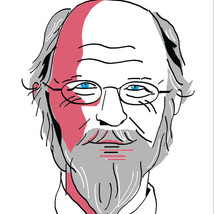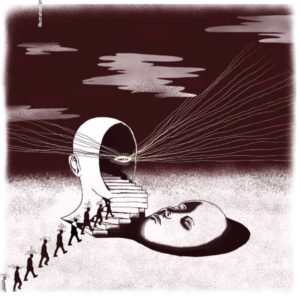« L’histoire de toute société jusqu’à nos jours est l’histoire de la lutte des classes » Marx & Engels, Manifest der Kommunistischen Partei ( février 1848)
Peut-on penser le complot ? Les médias mainstream considèrent que l’impensable doit rester impensé. Derrière eux se rangent, cela va sans dire, les bienpensants, toutes tendances confondues. Mais de quoi parle-t-on au juste ? D’une réalité qui appartiendrait au domaine (philosophique) de la raison pure ? Des conditions de possibilité (politiques) de la démocratie ? Ou de la difficulté (psychologique) extrême de comprendre, et de révoquer, les manipulations perverses(1) ? Commençons par planter le décor lexical.
Historiquement, l’évolution du lexique est plutôt simple. On ne complote en français, semble-t-il, que depuis 1450. Curieusement, on parle de « comploteuse » (1571), avant d’envisager qu’il puisse y avoir des « comploteurs » (1580)(2). Le Littré (1882 …
Vous devez être abonné pour visualiser cette page.
Si vous êtes déjà abonné, veuillez-vous connecter.
Dans le cas contraire, abonnez-vous dès à présent.
Si vous êtes déjà abonné, veuillez-vous connecter.
Dans le cas contraire, abonnez-vous dès à présent.
Notes et références
- Cf. Michel Weber, Covid-19(84) ou La vérité (politique) du mensonge sanitaire : le fascisme numérique, Louvain-la-Neuve, Éditions Chromatika, 2020 et Pouvoir de la décroissance et décroissance du pouvoir. Penser le totalitarisme sanitaire, Louvain-la-Neuve, Éditions Chromatika, 2021.
- Alain Rey (Sous la direction de), Dictionnaire historique de la langue française, Paris, Le Robert, 2011.
- Karl Popper, The Open Society and Its Enemies, Princeton, Princeton University Press, 2013, p. 306.
- The Open Society a été publié grâce à l’entregent de Hayek ; Popper est nommé professeur à la London School of Economics, en 1946 sur proposition de Hayek, et ainsi de suite.
- Hannah Arendt, The Origins of Totalitarianism (Antisemitism, Imperialism, Totalitarianism), New York, Harcourt Brace & Co., 1951
- « The Nazi development may be more logical, more consistent in itself, but the history of the Bolshevik party offers a better illustration of the essentially fictitious character of totalitarianism, precisely because the fictitious global conspiracies against and according to which the Bolshevik conspiracy is supposedly organized have not been ideologically fixed. They have changed—from the Trotskyites to the 300 families, then to various « imperialisms » and recently to « rootless cosmopolitanism »—and were adjusted to passing needs. » (Hannah Arendt, The Origins of Totalitarianism, p. 378)
- « We are opposed around the world by a monolithic and ruthless conspiracy that relies primarily on covert means for expanding its sphere of influence—on infiltration instead of invasion, on subversion instead of elections, on intimidation instead of free choice, on guerrillas by night instead of armies by day. It is a system which has conscripted vast human and material resources into the building of a tightly knit, highly efficient machine that combines military, diplomatic, intelligence, economic, scientific and political operations. » (J. F. Kennedy, Address before the American Newspaper Publishers Association, 27 April 1961).
- Hymer, Stephen, The International Operations of National Firms: A Study of Direct Foreign Investment. PhD Dissertation [1960] published posthumously, Cambridge, Mass, The MIT Press, 1976.
- Sandor Ferenczi, « Abwehrmechanismus der Identifikation mit dem Aggressor » [1932], in Schriften zur Psychoanalyse, Frankfurt am Main, S. Fischer, 1970–1972.
- Pierre-André Taguieff, « La pensée conspirationniste. Origine et nouveaux champs », in Emmanuelle Danblon et Loic Nicolas (Sous la direction de), Les Rhétoriques de la conspiration, Paris, Éditions CNRS, 2010, pp. 281–323.
- Hannah Arendt, « Truth and politics », The New Yorker, February 25, 1967 ; traduit in La Crise de la culture. Huit exercices de pensée politique, Paris, Éditions Gallimard, 1972, p. 289.
- Geoffrey Geuens, Tous pouvoirs confondus. État, capital et médias à l’ère de la mondialisation, Anvers, EPO, 2003.







